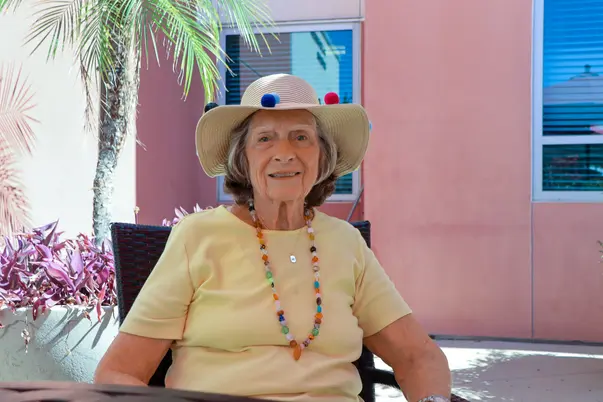Los Angeles Jewish Health Empowers Extraordinary Recovery


Los Angeles Jewish Health Empowers Extraordinary Recovery

Life is a joy for Marilyn Poliskin. The 88-year-old Los Angeles Jewish Health resident delights in diverse activities (jewelry making, painting, playing bingo, exercise), advocating for her peers (she serves as Fifth Floor Ambassador for the Joyce Eisenberg-Keefer building), and spending quality time with friends. But Marilyn didn’t always see things through such rose-colored glasses; just 18 months ago, she was fighting for her very survival. When asked about the dramatic turnaround, she credits the “incredible people and environment” she found at Los Angeles Jewish Health.
Born and raised in Patterson, New Jersey, Marilyn moved west with her husband and three children in the early 1970s. After the kids graduated from Beverly Hills High School, she and her husband separated, and she put down roots on her own in Santa Monica. It was then that she began a fulfilling, multi-decade career as an accounting supervisor for the Make-A-Wish Foundation, a “dream job” that allowed her to be part of an organization that was making a tangible difference in sick children’s lives.
Unexpectedly, one of Marilyn’s own (now adult) children, her daughter Amy, fell ill herself, with breast cancer. In order to be as present as possible for Amy – a single mother to a young son, Elias – Marilyn retired from Make-A-Wish after 23 years and focused on trying to help Amy heal. Tragically, the cancer ultimately took Amy’s life, and Marilyn became a full-time caregiver to eight-year-old Elias.
“I lost my daughter, my mother, and my husband (we separated but never divorced) in the same year, and suddenly I was raising my grandson all alone,” she says. “It was obviously a difficult time, but I was determined to be there for Elias and to give him everything he needed.”
It was after Elias had grown up and left the house that Marilyn developed a serious health issue. It took months to diagnose the problem (pneumonia, and a cascading series of complications that resulted from it), during which her son, Scott, who lives and runs a business in Indiana, took up temporary residence with her for eight months and tirelessly advocated for her as she underwent countless tests across multiple medical facilities. In the interim, Marilyn lost 86 pounds, and her blood pressure began to dip dangerously low.
“My blood pressure kept going down, and I would pass out,” she says. “It got so bad I couldn’t even stand up, and eventually I was bedridden.”
As time passed, Marilyn sunk into a devastating depression. “Honestly, it began to feel like I couldn’t go on,” she recalls. “What was the point if I wasn’t ever able to get out of bed and walk again?”
But Scott refused to let her give up, and through his determination they secured an open spot at Los Angeles Jewish Health. When she arrived, a switch inside her flipped. “My son and the therapy department at LAJH saved my life, no question,” she says. “I didn’t think I was capable of recovering, but Scott got me here, and the therapists, certified nurse assistants, licensed vocational nurses, and everyone else encouraged me in the most remarkable way and encouraged me to push myself. I kept thinking of Elias, and how he had already suffered so much loss, and how much I wanted to continue to be a presence for him. So, I took a deep breath, and decided to try.”
A year and a half later, the results are nothing short of astonishing. Marilyn is up and about every day, chatting with friends (“There isn’t any floor here where people don’t know me,” she laughs), decorating her room, and investing her energy in making life brighter for those around her. “My main wish now is to be healthy for other people,” she says. “I don’t like to see them depressed because I was there, and it makes me so happy when I can make someone else happy.”
Marilyn also attributes her recovery to the love and assistance of family: Scott, her other son, Tuvia, and her grandchildren (Sara, Erez, Isaiah, Elias, and his wife, Lily, whom she considers a fifth grandchild), who motivated her to find the will to keep on going. “I’m so proud of all of my grandchildren, who have been successful at such a young age,” she says. “They inspire me every day.”
She says having the privilege of waking up at Los Angeles Jewish Health is another big motivator. “Living here is the most positive turn of my entire life,” she enthuses. “When I look out my window, I can see the sunrise, the moon, and the stars, and it’s all so beautiful.”